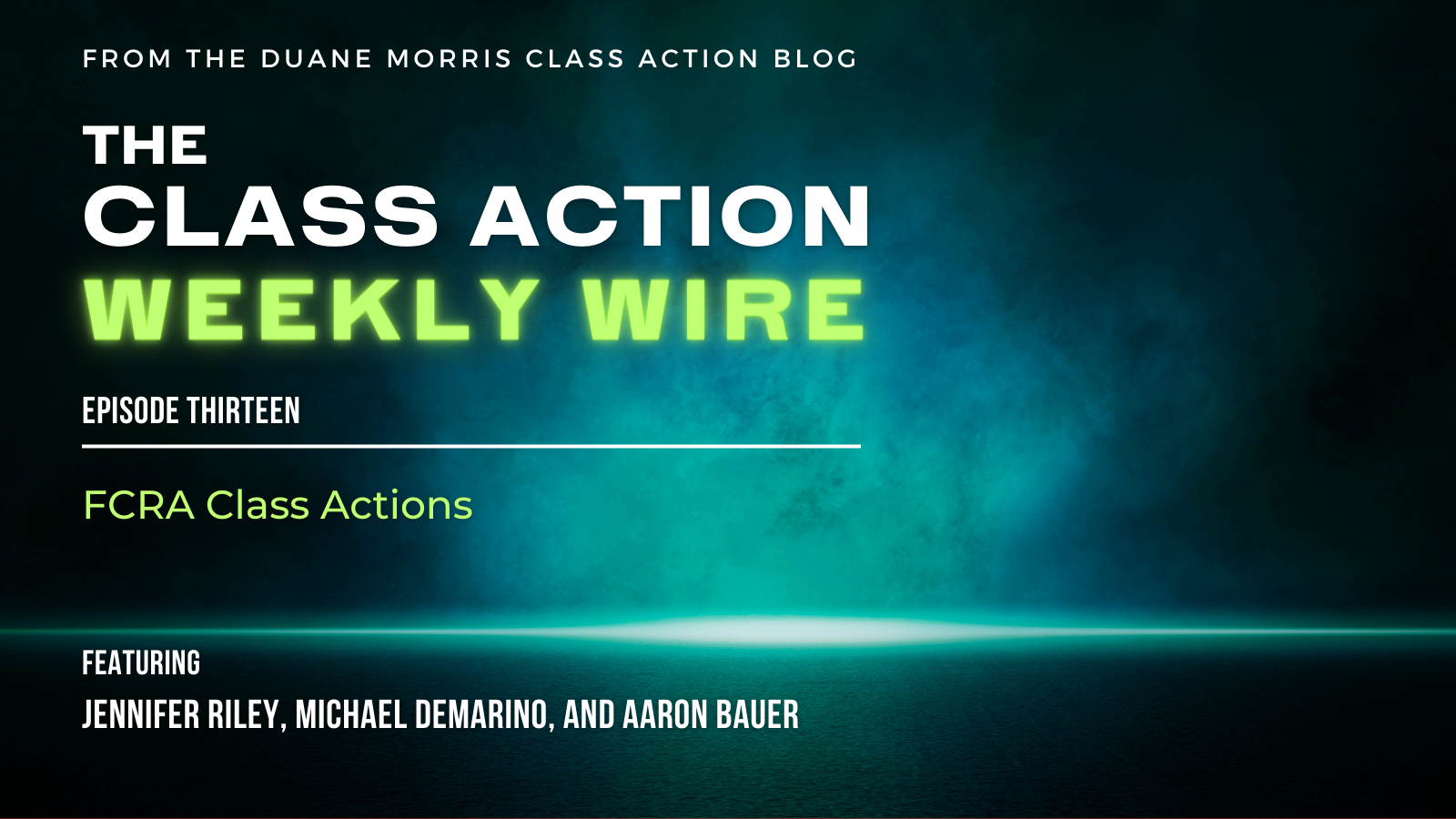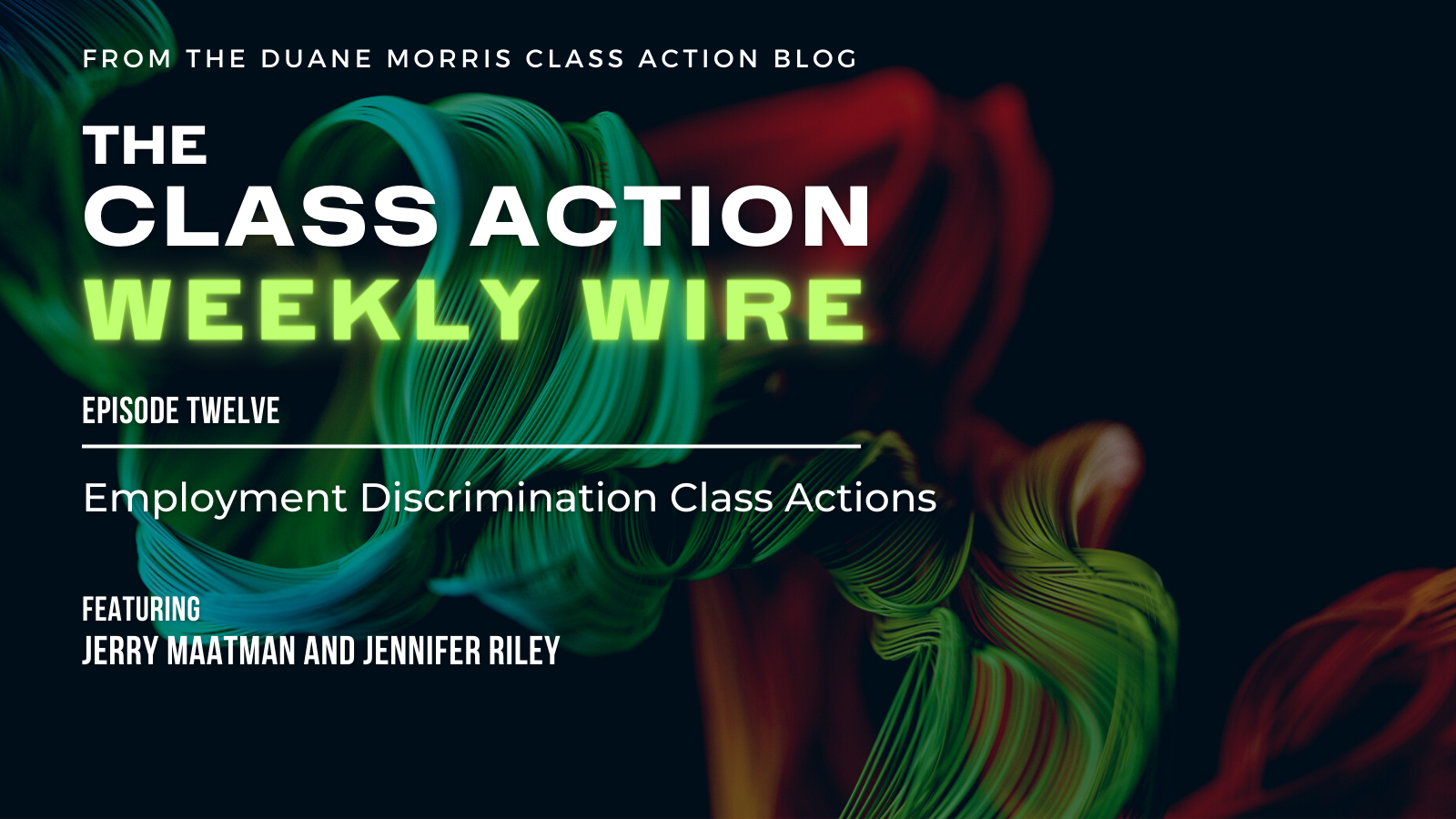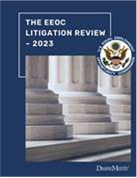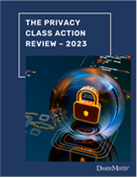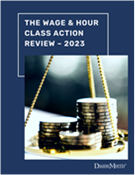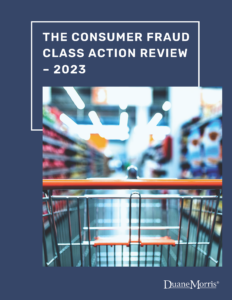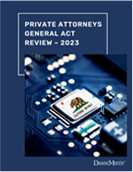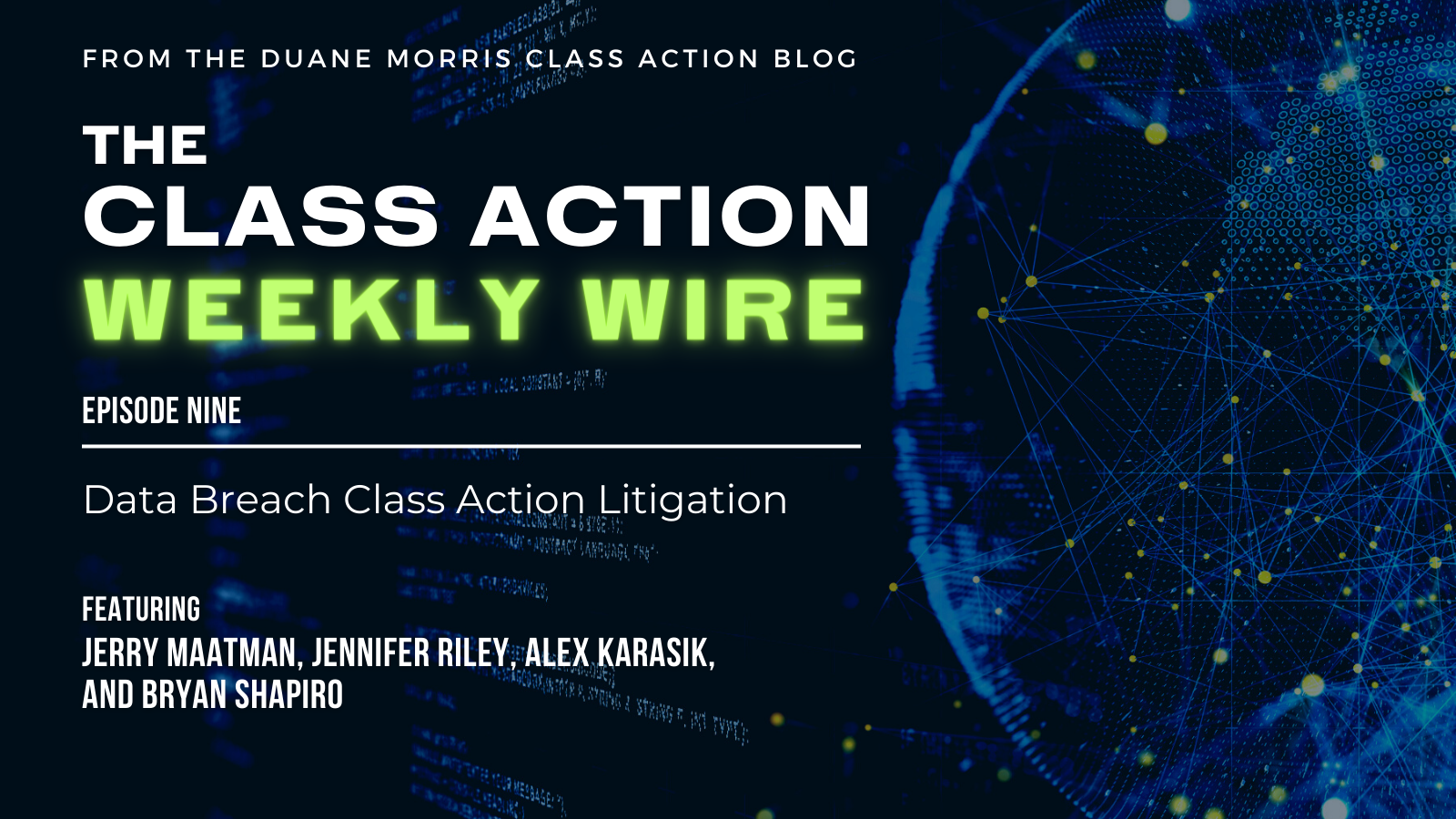Duane Morris Takeaway: This week’s episode of the Class Action Weekly Wire features Duane Morris partners Jennifer Riley and Mike DeMarino and associate Aaron Bauer with their analysis of the Fair Credit Reporting Act class action litigation trends and developments in 2022 and what to expect in 2023. We hope you enjoy it.
Eleventh Circuit Issues Landmark Ruling That Limits The EEOC’s Subpoena Powers
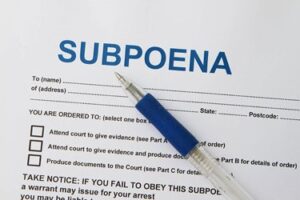 By Gerald L. Maatman, Jr., Alex W. Karasik, and Nicolette J. Zulli
By Gerald L. Maatman, Jr., Alex W. Karasik, and Nicolette J. Zulli
Duane Morris Takeaways: In EEOC v. Eberspaecher North America Inc. , No. 21-13799, 2023 U.S. App. LEXIS 11466 (11th Cir. May 10, 2023), a split three judge-panel for the U.S. Court of Appeals for the Eleventh Circuit affirmed an Alabama federal district court’s ruling and held that that an EEOC subpoena for nationwide information relative to an investigation over potential disability discrimination was too broad in scope.
Given that the EEOC’s pre-suit subpoena power is rarely limited by courts, this ruling is vitally important and apt to be cited by employers who are confronted with far-reaching EEOC subpoenas, particularly for nationwide employee data.
Case Background
A former employee at Eberspaecher North America Inc.’s (“ENA”) Northport, Alabama facility filed a charge with the EEOC, alleging ADA violations due to disability-related absences and his subsequent termination. Id. at *4. The initial charge listed only the Northport facility’s address and alleged discriminatory practices related to qualified leave. The charge did not advance any nationwide allegations.
In response, the EEOC requested information exclusively pertaining to the charged conduct from ENA’s Northport facility. However, the EEOC later requested nationwide nationwide data on employees terminated for attendance infractions at all of ENA’s locations. ENA declined to provide this information, leading the EEOC to issue a subpoena demanding the nationwide data.
On June 30, 2021, the EEOC filed an application for judicial enforcement of the subpoena with the U.S. District Court for the Northern District of Alabama. ENA moved to revoke the subpoena, arguing that it exceeded the scope of the charge. The District Court ruled in favor of ENA, ordering compliance with the subpoena limited to the Northport facility. The EEOC appealed the decision. Id. at *9.
The Eleventh Circuit’s Decision
The Eleventh Circuit affirmed the District Court’s order that ENA comply with the subpoena, “but only as it applies to [ENA’s] Northport facility.” Id. at *8.
On appeal, the EEOC attempted to argue that (1) because the charge was based on a review of ENA’s company-wide handbook; and (2) because the use of the term “aggrieved employees” in the charge meant “all employees” impacted by ENA’s allegedly unlawful practices, it was entitled to nationwide data. Id. at *16.
The Eleventh Circuit rejected these arguments because it presupposed that the charge targeted ENA facilities worldwide. Specifically, the Eleventh Circuit concluded that the charge, which solely referenced ENA’s Northport facility, constrained the EEOC’s subpoena power. It emphasized that the relevance of the requested information should be tied to the charge against the employer and not future charges. Additionally, the Eleventh Circuit noted that the EEOC never attempted to amend the charge to expand its scope. Id.
Rejecting the EEOC’s broad request for information, the Eleventh Circuit explained that “[t]he relevance that is necessary to support a subpoena for the investigation of an individual charge is relevance to the contested issues that must be decided to resolve that charge, not relevance to issues that may be contested when and if future charges are brought by others.” Id. at *5 (citing EEOC v. Royal Caribbean Cruise, Ltd., 771 F.3d 757, 761 (11th Cir. 2014)). The Eleventh Circuit further explained that the charge did not provide notice of an investigation into ENA’s facilities nationwide. Accordingly, the Eleventh Circuit held that the District Court did not abuse its discretion by enforcing the EEOC’s subpoena of information only as to the Northport facility.
Implications For Employers
The Eberspaecher decision is noteworthy because court rulings that restrict the EEOC’s pre-suit enforcement actions are uncommon, particularly at the appellate level. This decision provides a roadmap for employers to challenge subpoenas or requests for information that exceed the charge’s scope.
While this decision represents a significant blow to the EEOC’s common practice of seeking company-wide data in administrative subpoenas, employers should note that the EEOC may seek to amend charges to include systemic allegations before serving future subpoenas. Accordingly, while this ruling is a rare management-side victory in EEOC subpoena enforcement actions, it remains to be seen whether future charges will be pleaded with an eye towards nationwide discovery in light of this new roadblock.
Seventh Circuit Affirms That ERISA Plan Sponsors Do Not Act As Participants’ Fiduciaries And Must Follow The Terms Of The Plan As Written
 By Gerald L. Maatman, Jr. and Jeffrey R. Zohn
By Gerald L. Maatman, Jr. and Jeffrey R. Zohn
Duane Morris Takeaways: More than 10 years after Plaintiffs filed suit in Carlson et al. v. Northrop Grumman Severance Plan et al., No. 22-1764, 2023 WL 3299703 (7th Cir. May 8, 2023), the Seventh Circuit put to rest the idea that a sponsor of an ERISA welfare-benefit plan is a fiduciary of the plan’s participants. Instead, per the ruling in Carlson, the sponsor is obligated to follow the terms of the plan as written. When the plan grants the sponsor discretion to determine who qualifies, the sponsor may exercise that discretion and may even change the way it exercises that discretion over time. If the plan does not grant the sponsor any such discretion, the sponsor must abide by the precise terms of the plan. The Seventh Circuit’s decision is well worth a read by corporate counsel, as it provides some bright-line tests for defense of class action claims brought under the ERISA.
Background And Context
Enacted in 1974, the Employee Retirement Income Security Act (“ERISA”) is the culmination of a long line of legislation concerned with the labor and tax aspects of employee benefit plans. In light of the often rapidly evolving retirement and health care needs of employees and their families, the ERISA has been subject to numerous amendments since its enactment nearly 50 years ago. Nonetheless, its primary aim has always been to protect the interests of participants and their beneficiaries in employee benefit plans.
The ERISA sets minimum standards for most voluntarily established retirement plans (such as 401(k) plans) and welfare benefit plans (such as medical benefits). These plans must also meet certain ERISA-based standards in order to qualify for favorable tax treatment.
Importantly, the ERISA explicitly empowers a participant of an employee benefit plan – including former employees in certain circumstances – to bring a civil action to recover benefits due or to clarify rights under the terms of the plan. More often than not, such litigation takes the form of a class action.
Case Background
On April 9, 2013, Plaintiffs filed a class action lawsuit against their former employer – Northrop Grumman (“Northrop”) – seeking payment of severance benefits Plaintiffs alleged Northrop owed them when they were laid off in 2012.
The plain language of Northrop’s Severance Plan (the “Plan”) grants the HR Department discretion to determine who qualifies for benefits under the Plan and may notify recipients of their benefits via an HR Memo. Plaintiffs and the other class members did not receive the HR Memo upon being laid off and, therefore, did not receive benefits under the Plan.
After class certification, the U.S. District Court for the Northern District of Illinois granted Northrop’s motion for summary judgment. It held that the Plan’s language gives the HR Department discretion to choose who, if anyone, gets severance pay on being laid off. Carlson et al. v. Northrop Grumman Severance Plan et al., No. 13-CV-02635, 2022 WL 971873 (N.D. Ill. Mar. 31, 2022). The district court further opined that the ERISA does not prevent an ERISA severance plan from possessing and exercising discretion to determine recipients. Plaintiffs appealed to the Seventh Circuit.
The Seventh Circuit’s Ruling
On May 8, 2023, the U.S. Court of Appeals for the Seventh Circuit affirmed the grant of summary judgment in favor of Northrop.
The Seventh Circuit explained that the terms of ERISA welfare-benefit plans always control. While plan administrators must act in a fiduciary capacity when exercising discretion, the entities that establish the plans do not have the same obligation. Instead, those entities are entitled to act in their own interests and need not provide participants any vesting interests.
“A person possessing discretion may change the way that discretion is exercised,” according to the Seventh Circuit. Id. at 2. As such, if a sponsor is granted discretion in determining who qualifies for plan benefits, it is not required to treat all participants equally, even if “deliberate past practice, [] mistaken past practice, and [] mistaken efforts to describe the benefits in writing” suggest otherwise. Id. at 3.
However, that is only true when the sponsor does possess such discretion. An ERISA sponsor still must apply a pension or welfare plan as written. The terms of the plan itself always control. No administrators or clerical employees can vary its terms.
In Carlson, the terms of the Plan granted Northrop’s HR Department the discretion to provide severance benefits to laid off employees, including Plaintiffs, by delivering them an HR Memo. Plaintiffs did not receive severance benefits or an HR Memo. The Seventh Circuit did not find any relevance in Plaintiffs’ position that, prior to October 2011, every laid-off employee who qualified for severance benefits received the HR Memo. Even if Plaintiffs’ position was factually accurate, which Northrop denied, the Seventh Circuit reasoned that Northrop was still entitled to change its approach and select which, if any, laid off employees would receive severance benefits.
The Seventh Circuit was also unpersuaded by Plaintiffs’ argument that Northrop interfered with Plaintiffs’ rights (a position which effectively argues that Northrop’s HR Department is a fiduciary of the Plan’s participants). The Seventh Circuit concluded that it is not. Instead, Northrop’s HR Department was properly exercising the discretion given to it under the plain terms of the Plan.
Implications For Employers
The Carlson decision indicates that courts will continue to honor the terms of an ERISA welfare-benefit plan based on the plain terms of the plan (and not based on past practices or even written plan summaries).
Nonetheless, Carlson is not an invitation for plan sponsors to blindly exercise discretion in determining qualification of ERISA welfare-benefit plans. Instead, it serves as a reminder that sponsors do not have unlimited authority in the execution of the plan. Sponsors must follow the terms of the plan as written. If the plan does not grant discretion in the execution of the plan, then no discretion may be exercised. If discretion is granted, then it must be exercised carefully and within the bounds of the grant.
Therefore, in deciding whether a plan applies to certain employees, employers should carefully review the terms of the plan rather than merely rely on past practices or plan summaries.
The Class Action Weekly Wire – Episode Twelve
The Duane Morris Class Action Defense Blog’s 100th Post!
Duane Morris Takeaways: Since its inception in September of 2022, the Duane Morris Class Action Defense blog has now recorded its 100th post!!!!
Since our kick-off post, our data analytics show there have been over 20,000 views to blog posts, with thousands of our loyal subscribers reading about class action litigation developments. There are many highlights from the last 100 posts, but we wanted to provide just a few for you here. Click on the links below to see all the hot trends in class action litigation, and tune in below for a special thank you announcement from the blog’s editor, Jerry Maatman.
Overview Of The Last 100 Posts
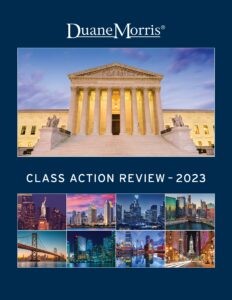 We launched the first edition of the Duane Morris Class Action Review, which is a one-of-its-kind publication analyzing class action trends, decisions, and settlements in all areas impacting Corporate America. The Review has been prominently featured in the media and is a must-have for all human resources professionals, business leaders, and corporate counsel.
We launched the first edition of the Duane Morris Class Action Review, which is a one-of-its-kind publication analyzing class action trends, decisions, and settlements in all areas impacting Corporate America. The Review has been prominently featured in the media and is a must-have for all human resources professionals, business leaders, and corporate counsel.
We also published five mini-books focused on specialized areas of law in class action litigation and on EEOC-Initiated litigation. Here are the links to our blog posts announcing the EEOC-Initiated Litigation Review, the Privacy Class Action Review, the Wage & Hour Class And Collective Action Review, the Private Attorneys General Act Review, and the Consumer Fraud Class Action Review.
 The blog also kicked-off the Class Action Weekly Wire Podcast, where experts in the field discuss trends and hot developments. Tune in every Friday for a new episode!
The blog also kicked-off the Class Action Weekly Wire Podcast, where experts in the field discuss trends and hot developments. Tune in every Friday for a new episode!
Click here to read our most viewed blog post entitled Massachusetts State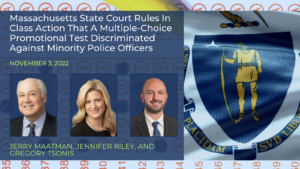 Court Rules In Class Action That A Multiple-Choice Promotional Test Discriminated Against Minority Police Officers. Over 2,000 people read this post!
Court Rules In Class Action That A Multiple-Choice Promotional Test Discriminated Against Minority Police Officers. Over 2,000 people read this post!
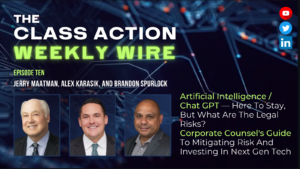 Click here to watch our most viewed Class Action Weekly Wire Podcast, regarding ChatGPT and artificial intelligence and the impact on class action litigation.
Click here to watch our most viewed Class Action Weekly Wire Podcast, regarding ChatGPT and artificial intelligence and the impact on class action litigation.
Thank you loyal followers for making the Class Action Defense blog your pick for class action litigation related information, trends, and analysis. We truly appreciate it! See below for a special message from the blog’s editor, Jerry Maatman. And please keep coming back, we promise to keep the content fresh!
The Class Action Weekly Wire: Mid-Year Review Of EEOC-Initiated Litigation
Congress To Consider Proposed FAA Amendment To Preclude Forced Arbitration Of Race Discrimination Claims
 By Eden Anderson and Rebecca Bjork
By Eden Anderson and Rebecca Bjork
Duane Morris Takeaways: The scope of claims that can permissibly be arbitrated under the Federal Arbitration Act (“FAA”) may narrow once again. Last year saw the enactment of the Ending Forced Arbitration of Sexual Assault and Sexual Harassment Act, which amended the FAA to preclude a pre-dispute agreement to arbitrate claims involving allegations of sexual harassment or sexual assault. With that amendment, plaintiffs who file claims — either individual claims or putative class action claims — that relate to a sexual harassment or sexual assault dispute may now, at their option, pursue such claims in court and cannot be compelled to submit those claims to arbitration. Now Congress may soon consider that sort on ban for claims involving race discrimination.
Proposed Legislation
Sen. Cory Booker and Rep. Hank Johnson announced plans this week to introduce a bill — the Ending Forced Arbitration of Race Discrimination Act of 2023 — to further amend the FAA to preclude arbitration of race discrimination claims. While the parameters of the proposed bill are as yet unclear, presumptively it will seek to preclude arbitration of both individual and class action race discrimination claims, and possibly more.
The Ending Forced Arbitration of Sexual Assault and Sexual Harassment Act was initially drafted to cover all claims alleging “sex discrimination disputes,” but was then narrowed to only apply to sexual harassment and sexual assault claims. If Congress was not willing to ban arbitration of sex discrimination claims, it may not be willing to ban arbitration of race discrimination claims.
Implications For Employers
As states and Congress continue to take steps to limit the use of arbitration, it remains critical for businesses and employers to regularly review their arbitration agreements to ensure compliance with an often-changing landscape of laws.
As the FAA approaches its 100-year anniversary, its impact will be less profound if Congress continues to enact claim-specific carve outs.
Artificial Intelligence / Chat GPT – Here To Stay, But What Are The Legal Risks? Corporate Counsel’s Guide To Mitigating Risk And Investing In Next Gen Tech
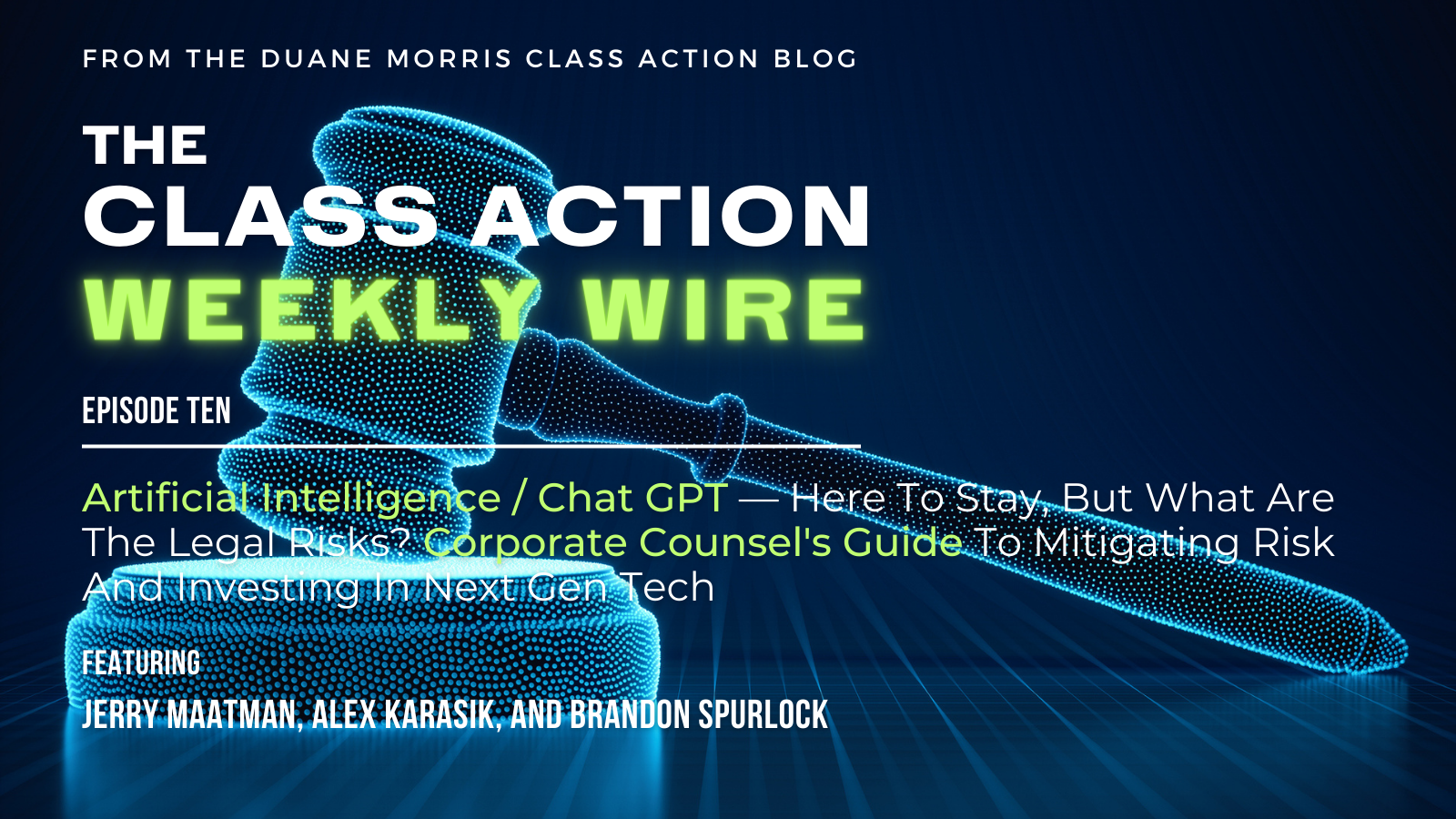 Duane Morris Takeaway: This week’s episode of the Class Action Weekly Wire features Duane Morris partners Jerry Maatman, Alex Karasik, and special counsel Brandon Spurlock with their analysis of significant trends and developments in artificial intelligence and Chat GPT and how it will impact class action litigation. We hope you enjoy it!
Duane Morris Takeaway: This week’s episode of the Class Action Weekly Wire features Duane Morris partners Jerry Maatman, Alex Karasik, and special counsel Brandon Spurlock with their analysis of significant trends and developments in artificial intelligence and Chat GPT and how it will impact class action litigation. We hope you enjoy it!
Texas Supreme Court Reaffirms “Rigorous and Searching Judicial Analysis of Plaintiffs’ Claims” Required Prior to Class Certification
 By Gerald L. Maatman, Jr. and Emilee Crowther
By Gerald L. Maatman, Jr. and Emilee Crowther
Duane Morris Takeaways: In American Campus Communities, Inc. v. Berry, No. 21-0874 (Tex. Apr. 21, 2023), the Texas Supreme Court unanimously reversed the trial court’s class certification order and disposed of the appeal on the grounds Plaintiffs’ claims were facially defective. In rendering its decision, the Texas Supreme Court emphasized that both district and appellate courts, to comply with Texas Rule of Civil Procedure 42 (“Rule 42”), must examine the substantive law underlying Plaintiffs’ claims prior to granting or affirming class certification. The Texas Supreme Court’s decision in this case ultimately serves as a roadmap for trial and appellate courts – as well as counsel for defendants – to ensure a meaningful and rigorous analysis of “the claims, defenses, relevant facts, and applicable substantive law” underlying Plaintiff’s claims prior to granting class certification under Rule 42.
Case Background
American Campus Communities, Inc. and its related companies (“ACC”) own and manage student housing properties throughout the United States. Plaintiffs, four former tenants of ACC’s properties in Texas, filed suit against ACC alleging it omitted language from its leases required under Section 92.056(g) of the Texas Property Code, and requested the trial court to certify a class of 65,000 former ACC tenants whose leases did not include the required language.
In addition to opposing the class certification, ACC moved for summary judgment on Plaintiffs claims. It contended that the Property Code does not create strict liability for an omission of the required statutory language. The district court denied ACC’s summary judgment and granted Plaintiff’s motion for class certification. The court of appeals affirmed a modified version of the trial court’s order, and authorized class-wide litigation on Plaintiffs asserted statutory strict liability claim regarding the omitted lease term. Neither the district court nor the court of appeals analyzed the substantive law governing Plaintiffs’ proposed class claims.
The Texas Supreme Court’s Decision
On further appeal, the Texas Supreme Court spent the majority of its opinion addressing the obligation of a district trial and appellate court to conduct a meaningful and rigorous analysis of “the claims, defenses, and applicable substantive law” underlying a Plaintiff’s claims prior to granting class certification under Texas Rule 42. Id. at 6-7 (quoting Sw. Refin Co. v. Bernal, 22 S.W.3d 425, 435 (Tex. 2000) (emphasis original)). The Supreme Court held that the failure of the district court and appellate court to analyze the applicable substantive law underlying Plaintiffs claims prior to class certification was error and “an example of the ‘certify now and worry later’ approach to class certification.” Id. at 10 (citing Bernal, 22 S.W.3d at 435 and BMG Direct Mktg., Inc. v. Peake, 178 S.W.3d 763, 778 (Tex. 2005)). For courts to comply with their obligations under Rule 42, they must rigorously scrutinize the legal underpinnings of the alleged class claims prior to class certification.
This rigorous analysis, the Supreme Court held, is required even when it is entangled with the merits, as a “court’s duty under Rule 42 to conduct a meaningful analysis of the proposed claims . . . is more fundamental than . . . avoiding premature resolution of the merits.” Id. at 15. While the Supreme Court made clear that a court should not decide the merits of the case in a class certification analysis, it must still understand the law governing the Plaintiffs claims and “gauge the claim’s suitability for class resolution on the basis of that understanding.” Id. at 14.
Due to the failure of the district court and appellate court to analyze the governing law at the class certification stage, the Supreme Court analyzed the substantive law at issue in the case, and ultimately held that class certification was improperly granted as “a proper understanding of the substantive law applicable to the proposed class claims indicates that no such claims exist.” Id. at 19.
Implications For Employers
The Texas Supreme Court’s decision in American Campus Communities, Inc. teaches various lessons. It serves as a reminder that class certification on claims that are not supported by underlying substantive law is legally invalid. For Defendants, it underscores the importance of analyzing the merits of claims at the beginning of the lawsuit, and of moving for a summary judgment on the merits of the underlying claims before class certification.

